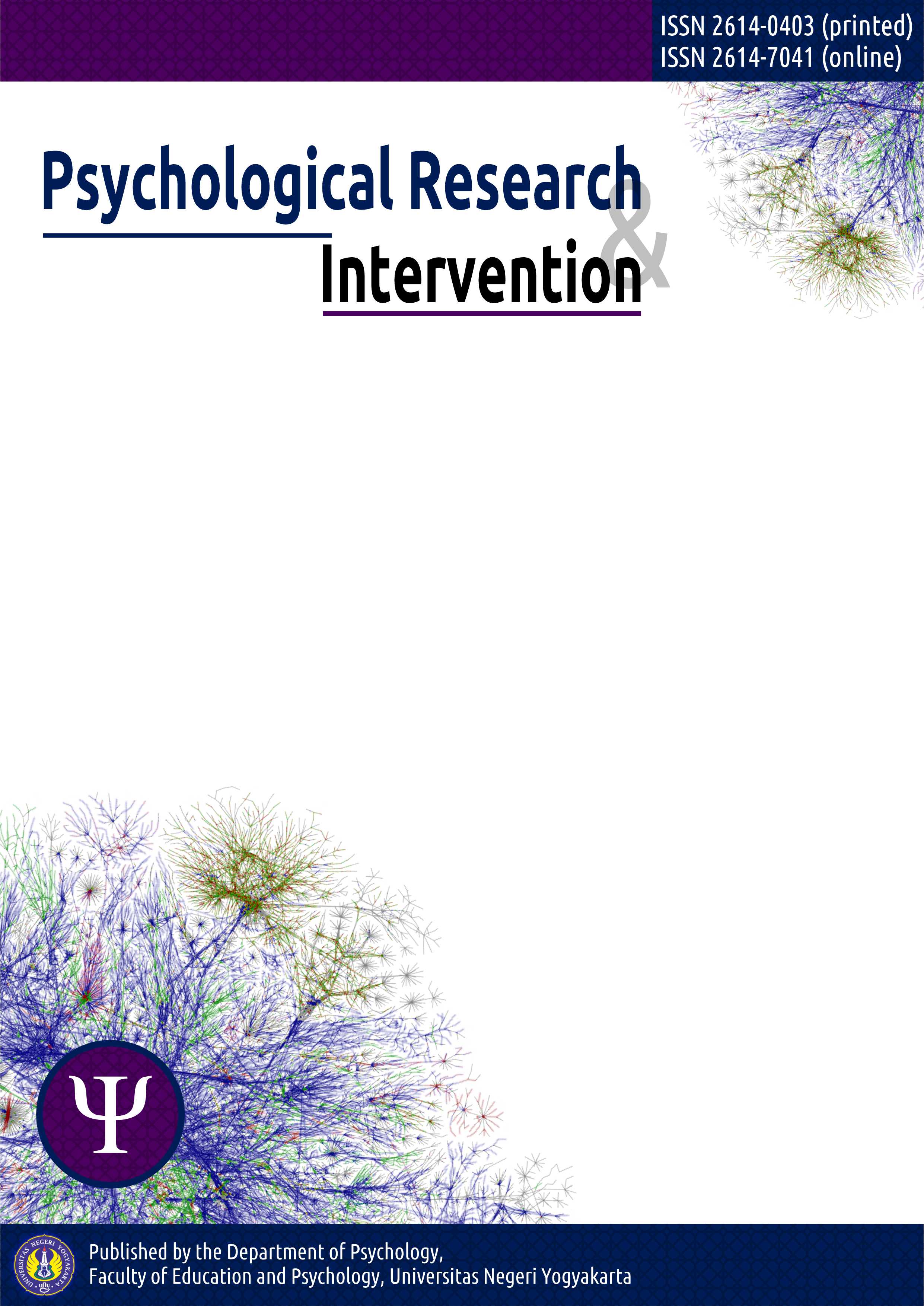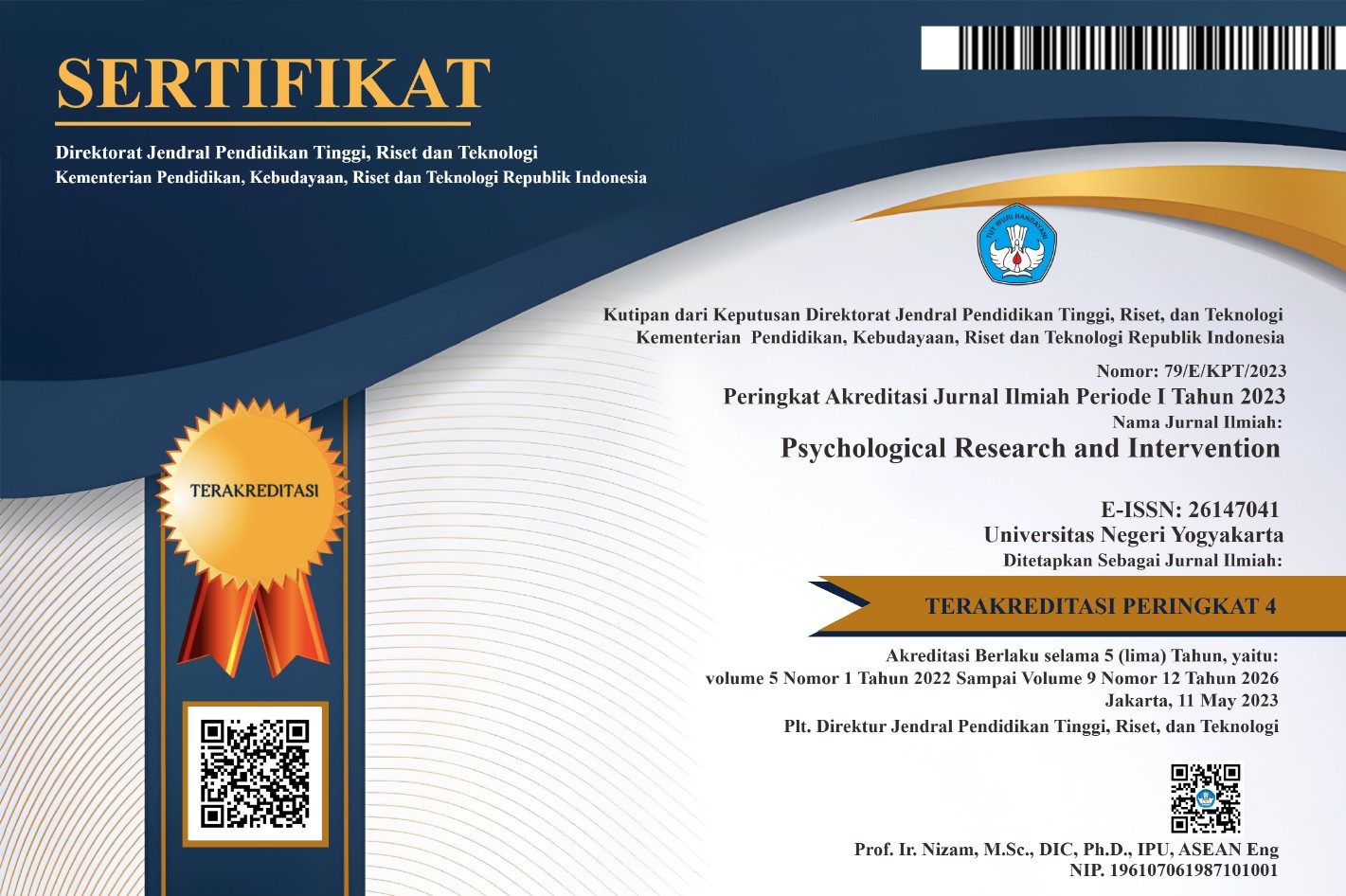Forgiveness therapy to increase psychological well-being of family caregivers of patients with schizophrenia
DOI:
https://doi.org/10.21831/pri.v5i2.60550Keywords:
schizophrenia, family caregiver, Forgiveness Therapy, psychological well-beingAbstract
Schizophrenia is a severe mental disorders with the highest prevalence among many in Indonesia. Family members who are involved in patients' recovery process may experience subjective burden such as psychological distress and negative emotions, which in turn decrease their psychological well-being. An intervention may be needed to enhace the psychological well-being of family caregivers. This study aimed to investigate the influence of Forgiveness Therapy to psychological well-being in family caregivers of schizophrenic patients. This study used single-case A-B-A design with 3 participants. Caregivers' forgiveness and psychological well-being measured using Heartland Forgiveness Scale for Caregiver, Forgiveness Checklist, Psychological Well-Being Scale, and Psychological Well-Being Checklist. Data analysis through visual inspection revealed that participants' forgiveness and psychological well-being score increased during and after therapy and descriptive analysis showed that participants experienced therapeutic impacts in psychological well-being dimensions. However, this result could not be confirmed as the effect of therapy since the baseline of psychological well-being for these three participants appeared to be unstable. In conclusion, Forgiveness Therapy in this study could not increase the psychological well-being of family caregivers of patients with schizophrenia.
References
Alberto, P. A. & Troutman, A. C. (2009). Applied behavior analysis for teachers (8th ed.). New Jersey: Pearson Education Inc.
Barker, J., McCarthy, P., Jones, M., & Moran, A. (2011). Single-case research methods in sport and exercise psychology. New York: Routledge.
Barret, P., Hale, B., & Butler, M. (2013). Family care and social capital: Transitions in informal care. New York: Springer Science and Business.
Bigham, E., McDannel, L., Luciano, I., & Salgado-Lopez, G. (2014). Effect of a brief guided imagery on stress. Biofeedbcak, 42(1), 28-35
Bono, G., McCullough, M. E., & Root, L. M. (2008). Forgiveness, feeling connected to others, and well-being: Two longitudinal studies. Personality and Social Psychology Bulletin, 34(2), 182-195
Cheavens, J. S. & Dreer, L. E. (2009). Coping. Dalam S. J. Lopez. The encyclopedia of positive psychology (hal. 232–239, vol. 1). West Sussex: Wiley-Blackwell.
Cheng, S. T., Ip, I. N., & Kwok, T. (2014). Caregiver forgiveness is associated with less burden and potentially harmful behaviors. Aging and Mental Health, 17(8), 930-934
Dhyani, D., Sen, S., Raghumahanti, R. (2015). Effect of progressive muscular relaxation on stress and disability in subjects with chronic low back pain. Journal of Nursing and Health Sciences, 4(1), 40-45
Elmahdi, M., Kamel, F., Esmael, A., Lotfi, M., Kamel, A., & Elhosini, A. (2011). Burden of care on female caregivers and its relation to psychiatric morbidity. Middle East Current Psychiatry, 18(2), 65-71
Enright, R. D. (2001). Forgiveness is a choice: A step-by-step process for resolving anger and restoring hope. Washington: American Psychological Association.
Fenech, M. & Scerri, J. (2014). The impact of providing care to relatives with a severe mental illness: the caregivers' experience. Malta Journal of Health Sciences, 19-23
Fleischhacker, W. W. & Stolerman, I. P. (2014). Encyclopedia of schizophrenia: Focus on management options. New York: Springer
Gupta, A. & Sharma, R. (2013). Burden and coping of caregivers of physical and mental illness. Delhi Psychiatry Journal, 16(2), 367-374
Gupta, A., Solanki, R. K., Koolwal, G. D., & Gehlot, S. (2015). Psychological wellbeing and burden in caregivers of patients with schizophrenia. International Journal of Medical Science and Public Health, 4(1), 70-76
Gull, M. & Rana, S. S. (2013). Manifestation of forgiveness, subjective well-being, and quality of life. Journal of Behavioural Sciences, 23(2)
Halgin, R. P. & Whitbourne, S. K. (2005). Abnormal psychology: Clinical perspectives on psychological disorders (4th ed.). New York: McGraw-Hill.
Kapoor, G. & Kumar, R. (2014). The study of general well-being of caregivers of schizophrenic patients. International Journal of Education and Science Research Review, 1(6), 50-55
Kashdan, T. B. & Ciarrochi, J. (2013). Mindfulness, acceptance, and positive psychology: The seven foundations of well-being. Oakland: Context Press.
Kaushik, P. & Bhatia, M. S. (2013). Burden and quality of life in spouses of patients with schizophrenia and bipolar disorder. Delhi Psychiatry Journal, 16(1), 83-89
Kazdin, A. E. (2011). Single-case research designs: Methods for clinical and applied settings (2nd ed.). New York: Oxford University Press.
Kementerian Kesehatan Republik Indonesia. (2013). Riset kesehatan dasar. Dipetik dari http://www.depkes.go.id/article/view/201410270010/lighting-the-hope-forschizoprenia-warnai-peringatan-hari-kesehatan-jiwa-tahun-2014.html
Koeswardhani, T. E. (2011). Terapi pemaafan untuk menurunkan beban subjektif pendamping pasien skizofrenia. Tesis. Universitas Gadjah Mada.
Kuipers, E., Onwumere, J., & Bebbington, P. (2010). Cognitive model of caregiving in psychosis. The British Journal of Psychiatry, 196, 259-265
Lawler, K. A., Younger, J. W., Piferi, R. L., Jobe, R. L., Edmondson, K. A., & Jones, W. H. (2005). The unique effects of forgiveness on health: An exploration of pathways. Journal of Behavioral Medicine, 28(2), 157-167
Loukzadeh, Z. & Bafrooi, N. M. (2013). Association of coping style and psychological well-being in hospital nurses. Journal of Caring Sciences, 2(4), 313-319
Lynch, A. B., Saunders, J., Seager, P., & Coyle, K. L. (2008). Talking about talking therapies: Pyschotherapy & psychosis. Dublin: Schizophrenia Ireland.
Malone, A., Meyer, D. D., Tarlton, T., Wasielewski, L., Reuben, P., West, C., & Mitchell, V. (2011). The relationship between forgiveness and emotional wellbeing. Diakses dari http://counselingoutfitters.com/vistas/vistas11/Article_23.pdf
Mohamad, M. S., Chong, S. T., Sarnon, N., Ibrahim, F., Alavi, K., & Akil, N. M. (2012). Manifestasi penjagaan keluarga: Tekanan psikologikal dalam menjaga pesakit mental. Journal of Social Sciences and Humanities, 7(1), 59-75
Nainggolan, N. J., & Hidajat, L. L. (2013). Profil kepribadian dan psychological wellbeing caregiver skizofrenia. Jurnal Soul, 6(1), 21-42
Nancy, M. N. (2013). Hubungan nilai dalam perkawinan dan pemaafan dengan keharmonisan keluarga. Proceeding PESAT (Psikologi, Ekonomi, Sastra, Arsitektur, dan Teknik Sipil, 5, 32-39
National Alliance for Caregiving. (2010). Care for the family caregiver: A place to start. Diakses dari www.caregiving.org/data/Emblem_CfC10_Final2.pdf, 2 September 2015
Nehra, R., Chakrabarti, S., Kulhara, P., & Sharma, R. (2005). Caregiver coping in bipolar disorder and schizophrenia: A re-examination. Social Psychiatry and Psychiatric Epidemiology, 40(4), 329-336
Prasetyo, N. H. (2014). Program intervensi narima ing pandum: Upaya peningkatan kesejahteraan psikologis family caregiver orang dengan skizofrenia. Tesis. Universitas Gadjah Mada.
Qiao, G., Li, S. & Hu, J. (2011). Stress, coping and psychological well-being among new graduate nurses in China. Home Health Care Management and Practice, 23(6), 398-403
Recine, A. C., Werner, J. S., & Recine, L. (2009). Health promotion through forgiveness intervention. Journal of Holistic Nursing, 20(10), 1-9
Reed, G. L. & Enright, R. D. (2006). The effects of forgiveness therapy on depression, anxiety, and posttraumatic stress for women after spousal emotional abuse. Journal of Counselling and Clinical Psychology, 74(5), 920-929
Rojviroj, W., Punyahotra, V., Sittiprapaporn, W., & Sarikaphuti, A. (2014). Study of brain activity analysis of deep breathing. Accessed from http://www.mfu.ac.th/school/anti-aging/File_PDF/research_inter/P2557_21.pdf
Ryff, C. D. (2014). Psychological well-being revisited: Advances in the science and practice of eudaimonia. Psychotherapy and Psychosomatics, 83, 10-28
Shah, A. J., Wadoo, O., Latoo, J. (2010). Psychological distress in carers of people with mental disorders. British Journal of Medical Practitioners, 3(3), 1-8
Sutton, P. M. (2013). The Enright process model of psychological forgiveness. Accessed https://couragerc.org/wp-content/uploads/ Enright_Process_Forgiveness_1.pdf
Tavousi, M. N. (2015). The effectiveness of progressive relaxation training on daily hassels: Moderatong role of hardiness and self-esteem. Procedia-Social and Behavioral Sciences, 190, 54-60
Thompson, L. Y., Snyder, C. R., Hoffman, L., Michael, S. T., Rasmussen, H. N., Billlings, L. S.,......Roberts, D. E. (2005). Dispositional forgiveness of self, others, and situations. Journal of Personality, 73(2), 313-360
Toussaint, L., Barry, M., Bornfriend, L., & Markman, M. (2014). Restore: The journey toward self-forgiveness: A randomized trial of patient education on selfforgiveness in cancer patients and caregivers. Journal of Health Care Chaplaincy, 20, 54-74
Vázquez, C., Herváz, G., Rahona, J. J., & Gómez, D. (2009). Psychological wellbeing and health: Contributions of positive psychology. Annuarion de Psicologia Clinica y de la Salude, 5, 15-27
Wade, N. G., Bailey, D. C., & Shaffer, P. (2005). Helping clients heal: Does forgiveness make a difference. Professional Psychology: Research and Practice, 36(6), 634-641
Wade, N. G. & Worthington, E. L. (2005). In search of common core: A content analysis of interventions to promote forgiveness. Psychotherapy: Theory, Research, Practice, and Training, 42(2), 160-177
Wiens, S. E. & Daniluk, J. C. (2009). Love, loss, and learning: The experiences of fathers who have children diagnosed with schizophrenia. Journal of Counseling and Development, 87, 339-348
Witvliet, C. V. (2009). Forgiveness. Dalam S. J. Lopez. The encyclopedia of positive psychology (hal. 232–239, vol. 1). West Sussex: Wiley-Blackwell.
Worthington, E. L., Scherer, M. (2004). Forgiveness is an emotion-focused coping strategy that can reduce health risk and promote health resilience: Theory, review, and hypotheses. Psychology and Health, 19(3), 385-405
Worthington, E. L., Witvliet, C. V. O., Pietrini, P., & Miller, A. J. (2007). Forgiveness, health, and well-being: A review of evidence for emotional versus decisional forgiveness, dispositional forgivingness, and reduced unforgiveness. Journal of Behavioral Medicine, 30, 291-302












